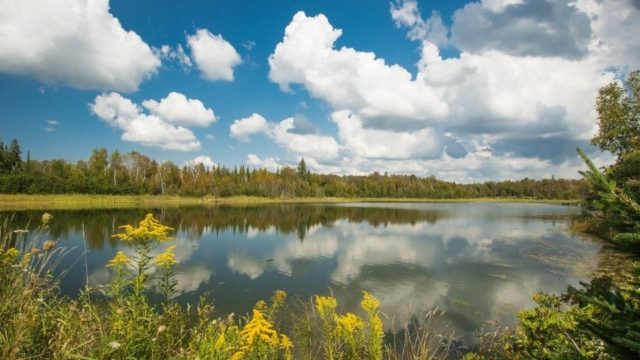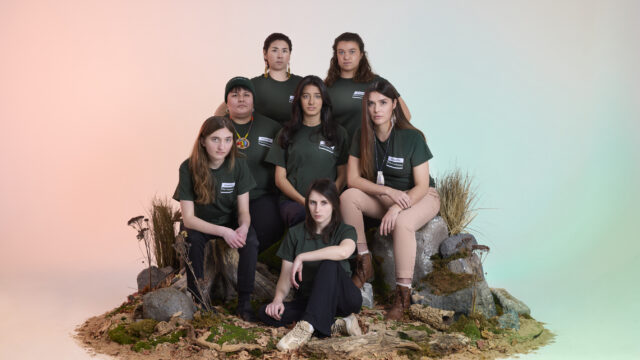It is a new year and the pandemic rages on. Yet hope is on the horizon.
As the coronavirus vaccine rolls out across the country and gives us some assurance that the tide will turn in the fight against COVID-19, it is essential Canada renews its efforts to combat the climate emergency and biodiversity crisis.
Here are three storylines the team at Ecojustice, Canada’s largest environmental law charity, will monitor and seek to shape in 2021.
Litigation to put brakes on environmental deregulation in Ontario
Last year, Premier Doug Ford’s government continued its spree of poor environmental regulation.
In April, it passed a regulation that suspended Ontarians’ legal right to participate in environmental decision-making. In July, it made sweeping changes to the Environmental Assessment Act and Planning Act. Then, in its 2020 budget bill, the government buried a mechanism that dramatically weakened conservation authorities’ powers to protect watersheds.
Ontarians took notice. In November, Ontario’s Auditor General Bonnie Lysyk called the Ford government out for repeated breaches of the province’s Environmental Bill of Rights. The consequence — affirmed by Lysyk’s report — is an Ontario whose eroded environmental protections expose people, the climate and ecosystems to irreversible harms.
More recently, the Ford government has faced fierce public opposition over its excessive use of Ministerial Zoning Orders (MZOs) to fast-track development.
Ecojustice, on behalf of Environmental Defence and Nature Ontario, has sued the Ford government over its unlawful use of an MZO to force through development on the Duffins Creek wetland, a vital wetland complex that provides community benefits such as flood mitigation, water filtration and carbon storage.
With the next provincial election scheduled to take place 18 months from now, Ontarians may begin to consider whether they can abide by another four years of environmental attacks or if it is time for change. In the meantime, expect continued public opposition and lawsuits over the Ford government’s anti-environment agenda.
Youth climate activists make history
In 2021, expect the wave of youth-led climate activism to keep surging in the courts. COVID-19 precautions may have forced young people to slow in-person advocacy, but they aren’t giving up the fight for their future — and they say the courts have a role to play in ensuring that future is protected.
The website climatecasechart.com, a database of climate litigation compiled by the Sabin Center for Climate Change Law at Columbia Law School and Arnold & Porter, highlights more than 1,300 climate cases in the United States and 407 outside of America. In Canada alone, the database lists 25 cases, including the youth-led Mathur et al. v. Her Majesty in Right of Ontario.
This year, Ecojustice will continue to represent the youth applicants in the Mathur case as they take the Ontario government to court for weakening the province’s greenhouse gas emissions targets and therefore violating Ontarians’ s. 7 Charter rights.
The youth enter 2021 fresh off a significant win in the Ontario Superior Court. In November, Judge Carole J. Brown dismissed the Ontario government’s motion to strike the youth-led case, marking the first time in history a court in this country has recognized the climate emergency has the potential to violate the Charter rights of Canadians.
This precedent could have a ripple effect on other climate lawsuits in Canada. And while a government attempt to appeal Justice Brown’s decision is likely to delay a hearing on the merits of Mathur et al., it could also lead to an even stronger precedent from a higher court sometime this year.
While litigation is emerging as a new front in the fight against climate change, the Mathur case also underscores the pressing need for robust legislative frameworks to tackle the climate crisis at all levels of government.
Climate accountability gains traction
As with COVID-19, the climate crisis threatens the health and safety of all Canadians.
The federal government’s COVID-19 response is grounded in Canada’s public healthcare system, which has its roots in the Medical Care Act of 1966. Similarly, we need strong systems and laws to address and manage mounting threats posed by climate change.
In the coming days and months, Ecojustice will press the federal government to strengthen and pass Bill C-12, also known as the Canadian Net-Zero Emissions Accountability Act.
Climate accountability law has already gained traction globally. A world-class climate accountability framework in Canada will put us on the same playing field as climate leaders such as New Zealand and the U.K. More importantly, such a law will ensure Canada has the roadmap and accountability mechanisms it needs to reach net-zero by 2050.
The ticking clock on climate change is reason enough to swiftly enact Bill C-12 – but time may also run out on this minority government, and Canadians could find themselves headed back to the ballot box in 2021. This means our elected representatives — the majority of whom ran in 2019 on party platforms promising climate action — must prioritize the passage of Bill C-12 and deliver the action Canadians voted for.
It’s clear that in 2021, our elected leaders will have the unenviable challenge of managing multiple, intersecting crises, including — but not limited to — the COVID-19 pandemic response and recovery, climate emergency, and mass biodiversity loss. This is no easy task, but our collective wellbeing depends on the tough choices that governments must make in charting a path forward on these fronts. Here at Ecojustice, we’re urging our governments to act with the courage and conviction needed to secure a safer, healthier future for all people in Canada — or face the consequences in court or at the ballot box.
This article was originally published by The Lawyer’s Daily a division of LexisNexis Canada. The Lawyer’s Daily is now called Law360 Canada.




